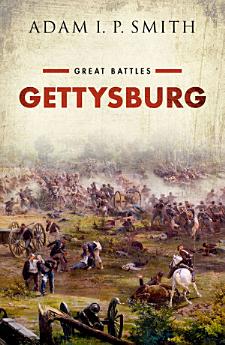Gettysburg
Jan 2025 · Oxford University Press
Ebook
224
Pages
family_home
Eligible
info
reportRatings and reviews aren’t verified Learn More
About this ebook
How did Gettysburg become the most famous battle of the American Civil War and one of the most consequential in world history? Why is the most visited battlefield, the place where veterans came in the greatest numbers, where Presidents pay homage, and millions of families have vacationed? What was it about this three-day struggle in July 1863 in the rolling hills of Pennsylvania that made it seem the "turning point of the war", or the "high-water mark" of the Confederate rebellion? Gettysburg explains the battle's place in the Civil War, why two vast armies clashed there, and how, in the century and a half since, it has been re-imagined, re-created and re-enacted. It is the story of a battle which no one planned but which became the bloodiest encounter of the war, and one with dramatically high stakes. The postwar romanticisation of Gettysburg as the place of "might-have-beens" is based on a kernel of reality. But it also suited the interests of both the winners and the losers for Gettysburg to become the Civil War in miniature: a glorious, storied, tragic tale small enough to comprehend, but large enough to be inspirational. If this was the battle that determined the war, Confederates could tell themselves that if only they had made different tactical choices, they would have won their independence, while Northerners could credit valour for their victory, without the unromantic need to invoke superior resources. Yet there was only a war because of slavery, and Gettysburg's importance lies in its role in ending it. In the speech Abraham Lincoln gave there, four months after the battle, he expressed the hope that Union victory would inaugurate a "new birth of freedom". The history of the battle has been shaped by a contest over what that means.
About the author
Adam I. P. Smith was born in the Northeast of England. He read History at Oxford before going on to do postgraduate work at Sheffield, Cambridge, and Harvard Universities. He taught at University College London before being appointed Edward Orsborn Professor of US Politics and Political History at Oxford. He is also the Director of the Rothermere American Institute and a Fellow of University College, Oxford. His previous books have included The Stormy Present: Conservatism and the Problem of Slavery in Northern Politics (2017), which won the Jefferson Davis Prize and was a finalist for the Lincoln Prize.
Rate this ebook
Tell us what you think.
Reading information
Smartphones and tablets
Install the Google Play Books app for Android and iPad/iPhone. It syncs automatically with your account and allows you to read online or offline wherever you are.
Laptops and computers
You can listen to audiobooks purchased on Google Play using your computer's web browser.
eReaders and other devices
To read on e-ink devices like Kobo eReaders, you'll need to download a file and transfer it to your device. Follow the detailed Help Center instructions to transfer the files to supported eReaders.






